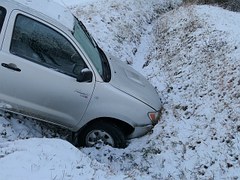If Snow or Ice Was Involved in the Accident, Can I Sue For Personal Injures?
The presence of ice is not a bar to bringing a personal injury claim.

While claims are not prohibited, it can make recovery more difficult. It may happen relatively infrequently, the area can get hit with massive amounts of snow in a short period of time. You may recall that Baltimore got 2 ¼ feet of snow over the weekend of January 24th 2016. Roads took days to clear, and, four days after the snowfall, not all roads were clean. There were innumerable car collisions and accidents. There was surely a noticeable uptick in insurance claims, and, no doubt three to nine months later, a flurry of resulting personal injury lawsuits. In these situations, the skilled insurance defense attorney will want a jury to be instructed that the accident was “unavoidable” due to ice, snow, or a combination thereof.
The skilled plaintiff’s attorney will argue that the presence of ice does not make an accident unavoidable. The plaintiff’s personal injury attorney should win that discussion.
It always surprised me when jurors or judges stop listening when they learns that ice was on the roadway. An accident is “unavoidable” if it is an inevitable occurrence which is not to be foreseen, or prevented by vigilance. Think of a meteor striking a car and propelling it into another car. Although meteors do hit the earth from time to time, most people would agree that is not to be foreseen, and absolutely not avoided. Ice on the road is not that situation. The presence, or likely presence of that hazard, requires drivers to take extra precautions: As Attorney Eric T. Kirk will tell you.
- to reduce speed and vehicle spacing
- to make contingency plans for stopping and the like.
- to be fully aware of the conditions of the road.
If the driver causing the accident failed to take these additional measures, he or she should not be absolved of responsibility for an injury causing event simply by stating the could not stop because of ice. Just because the roads are bad does not mean there is no fault to place in motor vehicle accident. A seasoned personal injury lawyer can make a difference in your case.



